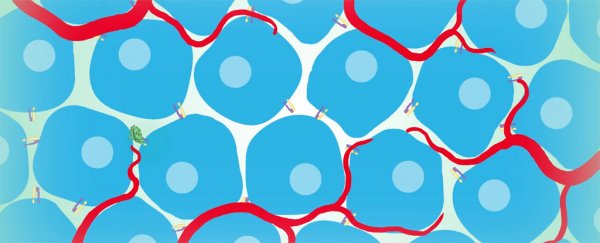Scientists have designed a therapeutic protein that can target receptors commonly found on the surface of unhealthy cells linked to the progression of a number of diseases, including cancer. It's hoped that the discovery of the new protein – and the particular way in which it binds to abnormal cells – could lead to new, more effective treatments in the future.
The protein in question is called ProAgio. Developed from a human protein, ProAgio targets a transmembrane receptor on the surface of cells called an integrin, which enables cells to interact with one another. The receptor ProAgio seeks out is called integrin αVβ₃ – a molecule that scientists have long looked at as a focus for medicines, since it often goes hand-in-hand with abnormal cells that can turn cancerous.
"This integrin pair, αVβ₃, is not expressed in high levels in normal tissue," said molecular biologist Zhi-Ren Liu from Georgia State University. "In most cases, it's associated with a number of different pathological conditions. Therefore, it constitutes a very good target for multiple disease treatment."
Integrin αVβ₃ isn't unique to unhealthy cells, though, and is often expressed in the cells of new blood vessels, macrophages (immune cells), and bone cells. But it's often at work in metastasising cancer cells that spread to other parts of the body, which is why it interests drug developers.
Scientists have previously developed treatments that hone in on αVβ₃ by a process called ligand binding, docking with the integrin by a form of chemical bonding. But until now, these techniques haven't been very successful, so Liu and his team adopted a different approach.
"We took a unique angle," he said. "We designed a protein that binds to a different site [of αVβ₃, called the βA-groove]. Once the protein binds to the site, it directly triggers cell death. When we're able to kill pathological cells, then we're able to kill the disease."
By a mechanism that the researchers don't yet fully understand, ProAgio recruits an enzyme called caspase 8 that plays an important role in apoptosis – programmed cell death. In other words, by targeting cells bearing the αVβ₃ receptors, ProAgio basically enlists caspase 8 and induces cells that stand a good chance of becoming cancerous to self-destruct.
In the researchers' testing on mice with tumours, ProAgio's effect was found to strongly inhibit tumour growth and reduce tumour blood vessels, while existing blood vessels were not affected. Toxicity tests showed that the treatment was not toxic to healthy mouse tissue.
Of course, as ProAgio has so far only been tested on animals, there's a long way to go before we'll know whether these beneficial effects extend safely to people. But it's still a very promising development, and we can't wait to see where this research leads.
You can see an animation explaining how the protein works in the video below, and the findings are reported in Nature Communications.

